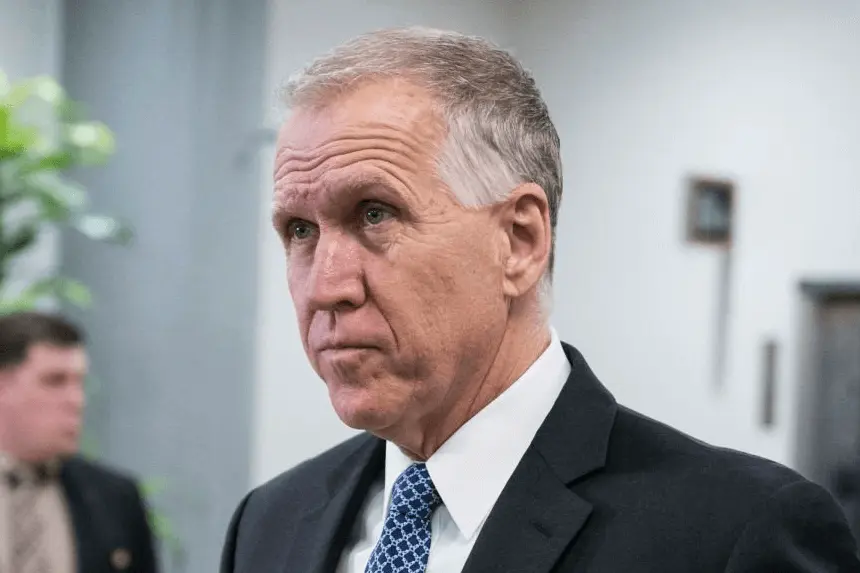Thom Tillis, a longtime North Carolina Republican Senator, announced that he will not be running in the re-election in 2026. His move was prompted by a significant vote where he deserted his party and its former president, Donald Trump, by voting against a general tax and budget reform package labeled as the One Big Beautiful Bill. The 64-year-old Tillis justified his decision, saying that lawmakers who understand the value of compromise and bipartisan success in Congress have turned into an endangered species in American politics. He was proud of his record, especially of initiatives that were accomplished with cooperation across the aisle, even when they were unpopular with the backlash of his party.
- What was the role of the Trump spending bill?
- What are the Actions of Trump to this Opposition of Tillis?
- Did Trump Answer Tillis Back?
- What does this portend for the future of the Senate?
- What Is the Leaving Legacy of Thom Tillis?
- What is the Medicaid Role in the Debate?
- Will More Moderate Republicans Follow Suit?
- Is Thom Tillis Able to be Replaced by Lara Trump?
- What is the Picture in 2026 and Beyond?
- Final Thoughts: Thom Tillis and the Future of the GOP
What was the role of the Trump spending bill?
The issue of the Tillis was the most visible agreement that Trump had on the budget bill; this measure included reductions in taxes and spending reforms. As much as the bill was supposed to mitigate costs, it also presented problems, more so, adding new requirements in Medicaid, such as work requirements, and even cutting the amount of cash states provide in funding medical services to the poor. Tillis expressed alarm over the fact that vulnerable groups would be disproportionately impacted in his home state as a result of these changes. He threatened to deny North Carolina billions of dollars of medical resources, and the greatest sufferers would be the old, the disabled, and the low-income population.
These Medicaid amendments became the last straw on the camel’s back for Tillis, who voted against the bill. His decision not to support the bill was a direct challenge to the power of Trump in the party and set the stage for a political blowup. Here is the link to our article on the Trump Guard Conflict
What are the Actions of Trump to this Opposition of Tillis?
In a classic Trump fashion, the grip of his wrath was taken on Tillis, who has publicly criticized him and threatened to vote against him in the next buddy primary election. The ex-president has all the more become more active in what concerns the shaping of the Republican candidate pool, and he did not take long to demonstrate his displeasure. Hours after Tillis voted, Trump launched an attack on the senator, accusing him of sabotaging a major plank of the conservative agenda.
In addition, Trump hinted at the fact that he was already having meetings with possible rivals, such as the suspected members of his inner circle, too. They included his daughter-in-law, Lara Trump, a North Carolina-born, now-swelling-political-goal.
Did Trump Answer Tillis Back?
Tillis, therefore, reacted calmly and ethically. He reiterated his commitment to the people of North Carolina and noted that he owes his loyalty to the people first and not to any single individual, including the former president. He claimed hato read the bill fully and that he could not, in good conscience, vote on a bill that would hurt every person he was being paid to represent.
Tillis emphasized that not every policy proposal is worth agreeing with and that one should be able to think critically even in cases where lives and livelihoods are on the line, which is only possible with strong leadership. Here is the link to our article on Musk Trump Fallout
What does this portend for the future of the Senate?
The loss of Tillis leaves an epic Senate seat in an extremely competitive swing state. His departure brings uncertainty in the political arena as both the Republicans and the Democrats are watching the position. A Republican primary may be the battleground of the traditional conservatives and other candidates conforming to the more radical agenda of Trump.
On the Democratic side, some of the possible contenders are gearing up to the advantage of this surprise. Now that Tillis is out of contention, national eyes will probably be on North Carolina as the indicator of the future of both parties.
What Is the Leaving Legacy of Thom Tillis?
The political career of Thom Tillis started when he was elected to the North Carolina House of Representatives and then became a senator of the United States in 2014. During his career, he was able to gain a reputation for being a pragmatist and for bipartisan cooperation. He voted in favor of bills related to criminal justice reform, LGBTQ + rights, and gun safety, and regularly voted across party lines when he thought this was in the best interest of the people.
His conservatism, mixed with a moderate approach to compromise, has become rather uncommon in the existing political environment. His departure is the loss of a voice of centrism in the Senate, as he was one of the few republicans who were always ready to work with democrats.
What is the Medicaid Role in the Debate?
The Medicaid reforms that would have restructured the U.S. healthcare system contained in the proposed budget bill, which Tillis opposed, were drastic indeed. Some of these reforms were the introduction of work requirements and restrictions on how states spend their Medicaid programs. Although the bill proponents claimed that these changes would slacken the fraud and enhance efficiency, its opponents, such as Tilli, asserted that this would lead to a vast atrophy of coverage.
With the new provisions, millions of Americans could lose access to health care, according to the estimates by the Congressional Budget Office. Tillis is concentrating on his constituents and on the practical implications of such reforms, and he has refused to budge on opposition.
Will More Moderate Republicans Follow Suit?
The resignation of Tillis shows the tendencies of moderate politicians to leave office due to feeling out of place in the current political climate. In recent months, some high-profile centrists in each party have even stated they are leaving, saying an environment of polarization and disdain toward bipartisan compromise has led them to leave.
With the growing polarization of the party lines, people who dare to criticize the leadership of their party become isolated. The departure of Tillis can be an eye-opener to more moderate politicians who are now not welcome in the national ring. It also has concerns about the future of the GOP, will it remain on the path of ideological purity, or accept independent thinkers?
Is Thom Tillis Able to be Replaced by Lara Trump?
Already, there is speculation among the possible successors,, and Lara Trump cannot be left out of this. Being a major figure of the Trump family with connections to the state of North Carolina, she would probably be fully supported by the former president.
But her experience in politics is not that high, and her candidacy may also result in an intensive discussion inside the party. It is possible that other established Republican leaders can also join the race, and the result will be a competitive, high-stakes primary. The results will determine the position of Trump in the future of the party.
What is the Picture in 2026 and Beyond?
The consequences of that vacancy might be far-reaching with regard to Thom Tillis. It not only influences the composition of the Senate, but also shows major divisions within the Republican Party. Positioned as one of the most-watched Senate races in the country, the midterms in 2026 have significant implications on federal healthcare policy, executive authority, and the status of Trump within the GOP hierarchy. All that will be decided in the race to take his place, which will probably act as a barometer of the party’s direction: toward Trump-style populism, or back toward a more conventional, policy-centered conservatism.
Final Thoughts: Thom Tillis and the Future of the GOP
With Thom Tillis vacating his seat in Congress, the exodus sends a clear message regarding the state of American politics. His retirement is not only the end of a long, successful career, it also a lesson about life (which can be taught to those seeking balance between loyalty and personal conscience).
The example that Tillis has shown and stood up to do what he is fighting to believe in is not only commendable, but unfortunately, not what we tend to see when we think of politics and compromise being regarded as weakness. The fact that he was not in favor of the Medicaid cuts, in particular, highlights his unwillingness to follow the party line and take care of the people of North Carolina.








